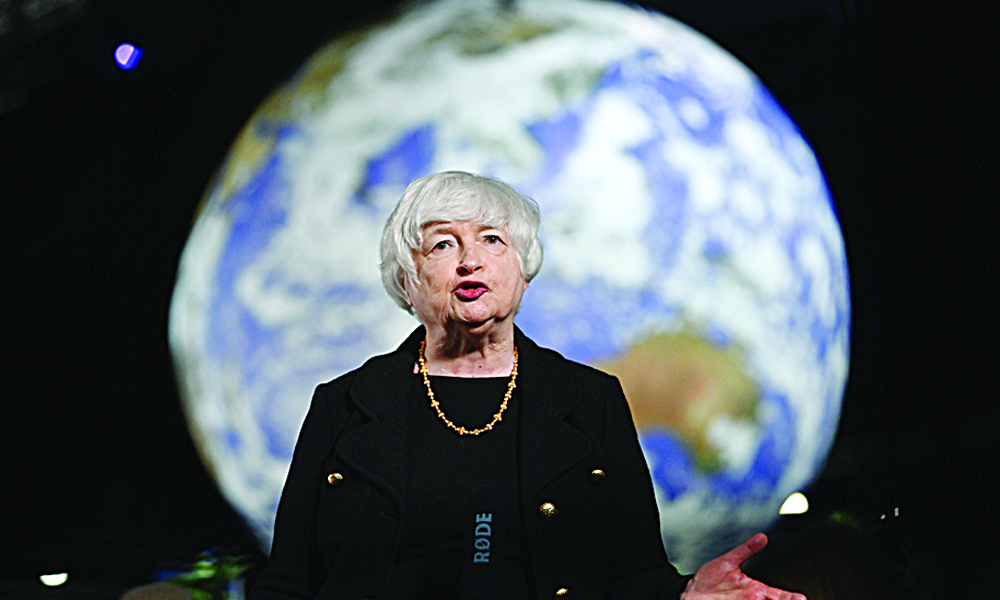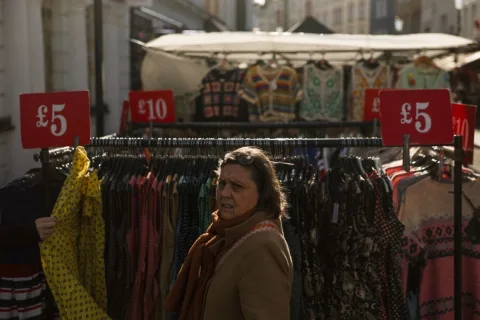WASHINGTON: US Treasury Secretary Janet Yellen said China needs to do more to accelerate global efforts to provide debt relief for poor nations that ramped up borrowing during the pandemic. In an interview with AFP, Yellen acknowledged the Group of 20’s initiative to help debtor nations “has not been going very rapidly,” and the United States “would hope to see more active participation” from China. Yellen participates virtually in the meeting of G20 finance ministers and central bankers in Jakarta Thursday and today, where growing concerns about the economic prospects of developing nations will be a central issue.
During the COVID-19 pandemic, the G20 put in place the Debt Service Suspension Initiative to help countries that borrowed heavily to deal with the twin health and economic crises, but that program ended in December. The G20 last year adopted the Common Framework plan meant to offer a path to restructure large debt loads, but it remains subject to uncertainty, and only three countries-Chad, Ethiopia and Zambia-have requested a negotiation under its terms. The World Bank and IMF have each warned of dire consequences unless more nations are granted forbearance.
A key hurdle is the lack of information on the size of debt owed to China, as well as some other lenders, by private companies as well as governments. While countries like China “have agreed to participate in the initiative,” Yellen said, “we certainly need to move more expeditiously than we have... to facilitate faster and more effective relief of debt through the common framework.”
China on Thursday defended the country’s participation, saying Beijing “comprehensively implements the Debt Service Suspension Initiative” and takes steps to “play a positive role in relieving the relevant countries’ debt burdens.” Foreign ministry spokesman Wang Wenbin pointed instead at creditors from developed countries as well as multilateral organizations, which he said “have a greater responsibility to help developing countries reduce their debt burden.”
COVID help
Yellen told AFP G20 finance officials this week also will continue to work on strategies to help countries deal with the pandemic, “which continues to be a major problem in many parts of the world.” “We’ll certainly focus on the need to help low-income economies and debt-ridden economies that are especially pressed because of the pandemic, (and on) how to facilitate faster and more effective relief of debt through the common framework,” Yellen said. The G20 also is working on boosting financing mechanisms through the IMF and World Bank, channeling resources to trust funds to satisfy immediate needs like vaccine distribution and broader efforts to prevent future pandemics, as well as to deal with climate issues, she said.
Yellen added that the officials will continue discussions on implementing a 15-percent global minimum corporate tax to “try to keep the momentum going.” She said G20 countries need to make more progress on the domestic steps needed to implement the tax on “highly profitable, multinational corporations.” In the United States, those steps were included in President Joe Biden’s Build Back Better legislative package, which opposition Republicans have blocked in the Senate. Yellen said the tax language in the bill was “widely agreed upon,” and would provide funds to pay for other priorities, and she is “confident there will be some legislation later this year.”
Yellen said “some global fallout” would result if the West moves ahead with the punishing, coordinated sanctions threatened against Russia, should it attack Ukraine. If the penalties are imposed, “of course, we want the largest cost to fall on Russia,” Yellen said in an interview. “But we recognize that there will be some global fallout from sanctions,” she said.
Her comments echoed President Joe Biden’s warning on Tuesday that an escalation of the conflict would not be “painless” for Americans. With Russian troops massed on the border with Ukraine, Biden continues to work with US allies on a diplomatic solution to the crisis, but has repeatedly warned Moscow of the dire consequences it will face if it moves against its neighbor. But she acknowledged worries about the “potential impacts on energy markets, given the importance of Russia’s role as a supplier of oil to the world market and of natural gas to Europe.”
Washington is “working with our European allies to try to, as best as possible, shield them from undue impact,” by ensuring that “supplies that are available, that come from other parts of the world” and to “try to make sure that oil and natural gas continue to flow to Europe.”
European Union officials said Wednesday they have secured alternate sources of natural gas and could survive a supply squeeze by Russia. Amid the prospects of armed conflict, and threats Russia could cut off energy supplies, oil prices have risen sharply in recent weeks, hitting $96 a barrel on Wednesday, the highest level since 2014. Natural gas prices have been more volatile, but also increased in the past week after dipping earlier in the month. —AFP











